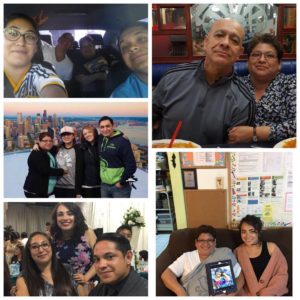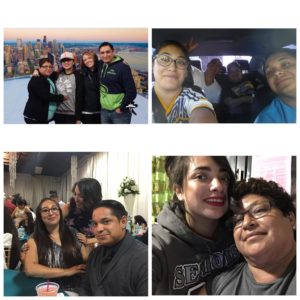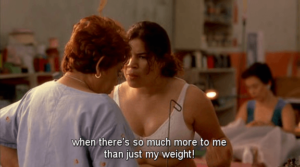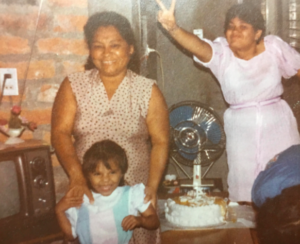
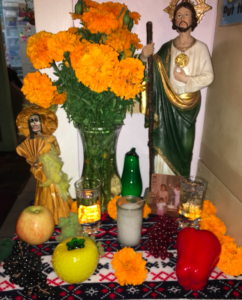 The altar I built with the help of my mother was for Margarita Valencia, her mother and my grandmother. I never had the chance to meet her because she passed away in El Salvador a couple of years after I was born. My mother always tells me stories about her and I feel as though my curiosity grows as I get older. Although we were not able to cross paths, I have a strong feeling that she is constantly around my family watching over all of us, especially my mother. With this altar, I hope I made it known to her that she means so much to me and I appreciate her for being able to create someone as amazing as my mother. This Dia de los muertos was dedicated to her and I could not imagine my altar being dedicated to someone other than her inspirational self.
The altar I built with the help of my mother was for Margarita Valencia, her mother and my grandmother. I never had the chance to meet her because she passed away in El Salvador a couple of years after I was born. My mother always tells me stories about her and I feel as though my curiosity grows as I get older. Although we were not able to cross paths, I have a strong feeling that she is constantly around my family watching over all of us, especially my mother. With this altar, I hope I made it known to her that she means so much to me and I appreciate her for being able to create someone as amazing as my mother. This Dia de los muertos was dedicated to her and I could not imagine my altar being dedicated to someone other than her inspirational self.
From the stories my mother has told me, Margarita lived a very difficult life as both a child and adult. Poverty, abuse, and loneliness are just some a few of the painful things she had to experience until her death. Her husband (I refuse to call him my grandfather or my mother’s father because of the terrible things he did to the women in the family) did not offer her the necessary support to maintain their family of eight. He was constantly using the little bit of money they earned for alcohol, cigarettes, and other unnecessary resources that would not benefit the family. My mother witnessed him beat Margarita that there days she would have to isolate herself in their home so no one would see the bruises he would leave on her body. He abused my mother for years but there was not anyone who had the courage to stand up for her because he was a dangerous and calculated man. When my mother was a teenager, Margarita’s husband was diagnosed with an aggressive form of cancer. They witnessed his health decline rapidly but still felt as though they were completely under his power. The family soon learned that his days were numbered and were stuck between feeling sad or relieved that he was no longer going to be (physically) in their lives.
Spirituality is something that is only practiced by a few people within my family. When I was in elementary school, my mother tried to get us all in the routine to attend church every Sunday. I knew that God was powerful but I found the church itself to be very uncomfortable and problematic. I just could not connect with anyone around us. Once I completed my first communion, we stopped going to church and decided to praise God in our home. When I was about twelve years old, I started experiencing signs of anxiety and went down the painful road of eating disorders and low self-esteem. My father experienced really painful health issues and since he was not able to work, paying our bills became nearly impossible. I would catch my mother crying throughout the day; she was just drained and tired altogether. This is the time where my mother decided to learn about spiritual practices to help us get through this difficult time. She started to conduct limpias around the house and visited curanderas for personal spiritual cleansings and other healing material she could place around our family. Her limpias consisted of cleaning the entire house thoroughly, mop the floors with holy water, and burn sage in each corner of every room. When she was finished, she would leave incense burning for an hour with the windows wide open in order to lead the negativity out of our home. Amazingly enough, our whole situation improved drastically over the next couple of months. Not only did my father’s health get better, but we were also able to save our home and begin making payments again. To this day, my mother sincerely believes that exploring the powers of spirituality allowed her to feel more connected to her ancestors who in return provided her assistance and healing during difficult times.
Over the past couple of years, there have been strange events occurring in my home. My mother and I have felt presences over our shoulders and the pressing feeling of someone watching us. My father, who is a skeptic of any paranormal and spiritual, says that everything we are feeling is just in our heads; we beg to differ. Before building the altar, my mother reconnected with her daughter in El Salvador and they would spend hours talking about Margarita. They shared laughs and tears remembering the life of a woman I never had the pleasure to meet myself. One night, my mother brought up a specific memory while chatting with her daughter online. During their conversation, a stack of books fell off a shelf; it seemed as though they were pushed off. Soon after, my mother noticed a strong smell of roses around the house, a scent similar to one her mother would wear. When she was explaining the incident to me a couple of minutes later, I was terrified to walk around my house because I did not want to experience the same thing. I kept telling my mother to stop telling me stuff like that because it makes me paranoid, but she calmly told me that there was no reason to be scared because she knew that it was her mother and she would do nothing to harm the family. Deep down, I have always wanted to feel some kind of connection to Margarita but did not know how to approach the idea to actually make it happen. Strangely enough, this class’s altar assignment was given just a few days after my mother had that strange experience.
When I first brought up this homework assignment to my family, they were a bit dazed and confused because we have never built an altar in our home or celebrated Dia de los Muertos. To be honest, I felt somewhat lost during the beginning of the assignment too because I did not know if my parents were going to be comfortable with me building an altar for individuals I was never really close to. I decided to choose Margarita Valencia because over the past couple of months, my mother began opening up more about her relationship with her mother. From the good experiences to the bad, she said it all. Although she may not be alive, I hope she knows I am grateful for the fact that she supported my mother and helped her become such an amazing and selfless person and I do wonder about her often. I wish I were able to dream about her in order to get an idea of what she looked like. I decided I wanted to devote positive energy and love to this altar along with the help of my family members, especially my mother.
During the process of building the altar, my mother and I were so confused over what to include and how to organize it. We looked at various examples on the Internet and were discouraged for a while because we felt like complete amateurs trying to build one. My mother only had one picture of her mother and it was mailed to her decades ago once she had already migrated to the United States and began building a home and family with my father. After getting over the insecurities we felt over our alter building, we decided to just ‘go with the flow’ and include material we felt comfortable and connected to. My mother is a devoted believer to Saint Jude. A couple of years ago, my sister bought my mother a statue of Saint Jude along with a necklace. She placed the statue on the dresser right next to her bed. My mother placed a glass of water right in front of the statue and every couple of days she refills it and says, “Ay, tenia mucha sed mi santo.” She decided to place the statue on the altar with the picture of her mother next to it hoping that it would bring both of them peace. Since marigolds are the traditional Dia de los muertos flower, we set up a bouquet in a vase and spread leaves all around the small table. We had some glass fruit in a cabinet, which we never used so my mother decided to bring those out and set them around the items that were already on the altar. When we stepped back and looked at the altar, my mother and I got chills all over our bodies and felt a strong sense of pride, relaxation, and happiness. My mother then commented that she thinks her mother is going to be feeling very welcomed when she comes around again.
In the novel So Far From God, Sofia embodies everything a chingona is supposed to be. Although she suffered immensely under the hands of men, she proved her resiliency and bravery by continuing to support her family and not letting the sadness of losing loved ones bring her down. Through her tristeza, she was able to become an active community member and provide individuals the support and guidance she was always trying to show her daughters. Sofia’s character made me think a lot about Margarita and my mother. Margarita’s life was made nearly impossible to live because of her abusive husband. She did everything in her power to try to keep her family in tact but he always had to find a way to make their situation more difficult. When he died, my mother told me that she would find Margarita crying for hours in the following days; she always wondered if she was crying over sadness or joy over her husband’s passing. Although their financial situation got more difficult after his death, Margarita proved to be courageous and independent because she provided resources for her eight daughters without the help of a male figure. People would constantly spread rumors about her status as a single woman taking care of so many children, but that never fazed her; she was trying to move on and be happy and that is what matters the most. I think these resilient characteristics of her were passed down to my mother because of the way she has always put her children first even if that meant she had to suffer for a while.
In the future, I hope I can have support from more of my family members to build altars in our home. I think starting this tradition in my family will help me connect more with my ancestors and Latina/o culture. My father is a bit more reluctant to discuss specific memories about his parents so I hope that he will begin opening up to me more as time goes by. It is difficult for my father to discuss stories about his parents because he drifted away from them at a very young age. When he was around ten years old, his mother abandoned his family and he never heard from her again. Once he migrated to the United States and started his new life here, his father passed away in a car accident; one of his regrets is not being able to see him one last time while he was still alive. I suppose death is difficult to remember in my family so we just try to distance ourselves from it altogether. For as long as I can remember, my father has tried his best to maintain the masculinity in his persona. To him, proving his manhood is the only way he could get respect from people. In the book Next of Kin, Richard Rodriguez states, “U.S. nationalism, with its intimate attachments to patriotism and xenophobia, has a remarkable way of collapsing into a single group racialized, economically disenfranchised people whose histories relate to the establishment of the border. All Latinos, then, would reductively be seen as incapable of matching the “family values” of the white, middle-class American citizenry”(71). My father took a lot of pride with being the family provider for decades. Over the past couple of years, his health has been declining but he refused to stop going to work because he did not want people to think he was weak. This year, doctors diagnosed with Parkinson’s disease and was granted disability for life, which means that, for his safety, he cannot work in his usual job settings again. I suppose talking to him about his family only makes him more sensitive because I think that remembering those memories would only cause him to get sentimental (something he rarely does in front of anyone). He was so used to being competitive about everything in the past and now he feels he has nothing to show for himself. Although I know it is not right to pressure him into telling my stuff about himself, I want to keep asking because I think it could serve as a healing process for him and help him realize that he will always be an amazing father in my eyes and does not need to match anyone’s expectations; he has always been enough.
Overall, this altar assignment has made me reflect on my family, culture, and traditions, something that I never devoted time to in the past. I also learned so much about myself and was able to acknowledge that I needed to try and communicate more with my parents because I think it makes them feel good knowing that one of their children is interested in their past, especially my mother. Talking to my mother about Margarita has made us spill secrets to one another for hours and I feel so much more connected to both of them each time. Dia de los muertos is a celebration that was very much present throughout my community as I was growing up, but I never thought I would have the opportunity to actually contribute something of my own. Hopefully in the future I will be able to continue this new tradition in my household with more cooperation from my father and siblings because I think it would bring us closer together and it would answer many questions that I have regarding my family.
To Margarita:
Every time my mother speaks of you, I cannot help but notice the love and adoration she has for you although you are not physically present on this Earth. Although I only have one picture of you, I know for a fact that your beauty, resilience, and courage are infinite. Nothing you did for your family will go unnoticed; I will make sure of it. Please know that through all of my mother’s accomplishments, she has kept you in mind. And I promise that through all of mine, I will keep you in mind, too. Te amo, abuela Margarita. For you, a thousand times over.

